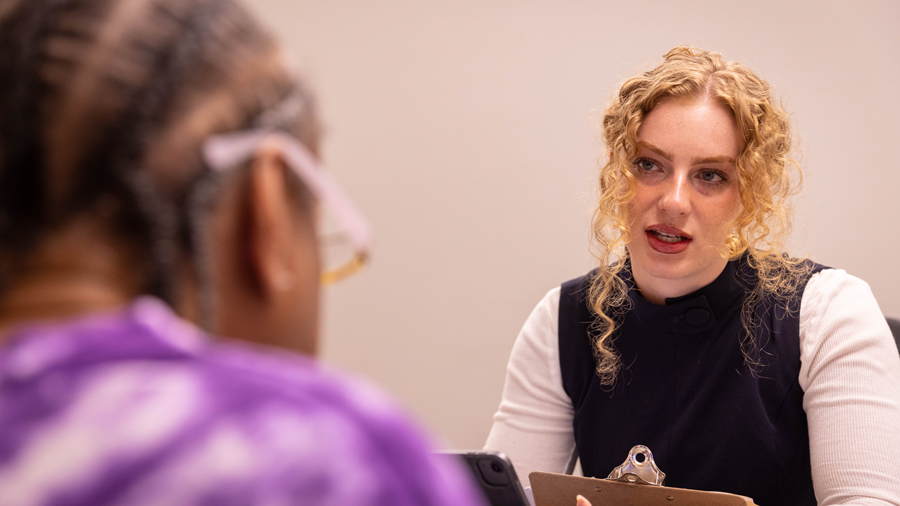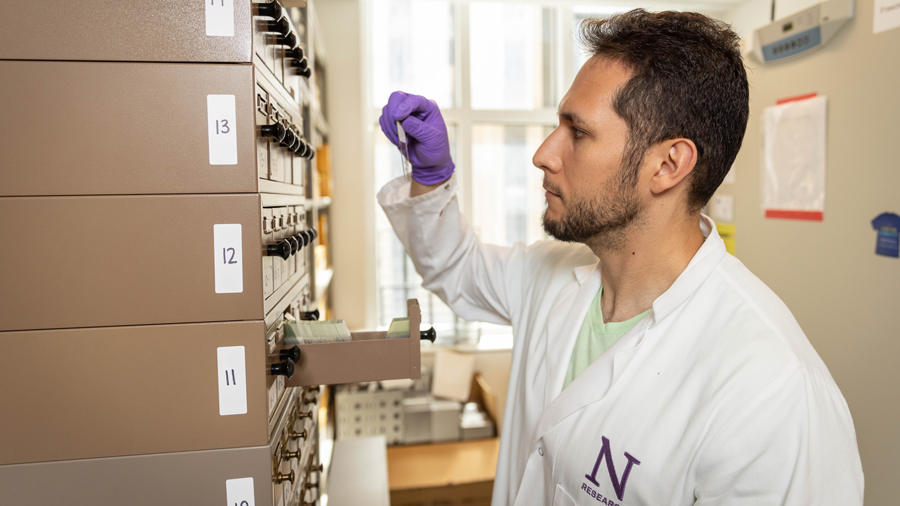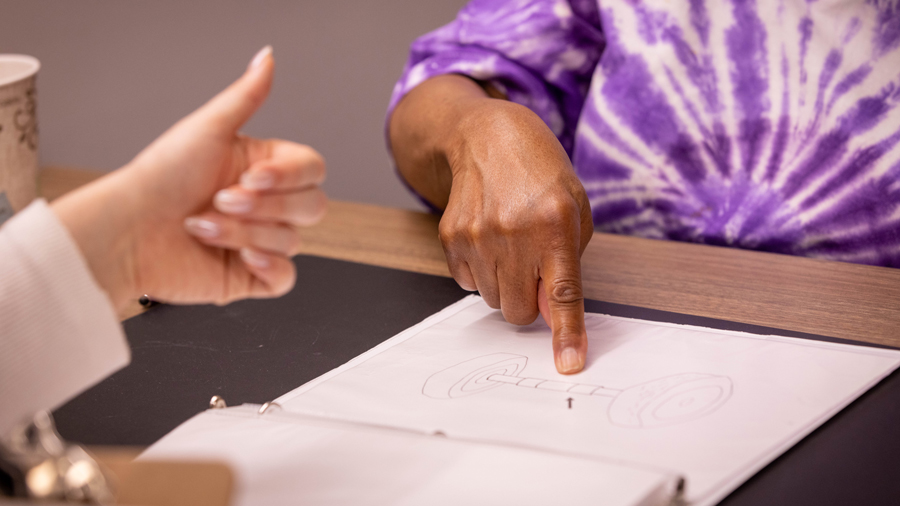A Multidisciplinary Approach to Cognitive Healthcare
The Neurobehavior and Memory Clinic brings specialists together to help individuals navigate their experiences.
By: Ananya Chandhok
Photos by: Shane Collins

The interdisciplinary team at the Northwestern Medicine Neurobehavior and Memory Clinic delivers personalized treatment and support plans for individuals with a diagnosis and their caregivers.
The Mesulam Center, home to the Northwestern Medicine Neurobehavior and Memory Clinic, has a unique philosophy embedded in every aspect of its practice – its multidisciplinary approach to cognitive healthcare.
Bringing together specialists from numerous fields under one roof was the brainchild of Marsel Mesulam, MD, founding director emeritus of the Mesulam Center and Ruth Dunbar Professor in Neuroscience and Neurology.
Mesulam built an environment for a continuously growing healthcare team, making them “more than a medical practice,” he said. It’s an integrated approach that involves medical care, neuropsychology, nursing, and social work. The Clinic’s foundation is built on what Mesulam calls “therapeutic encounter.” That means caring for individuals, helping enroll them in clinical trials, and offering them new programs and approaches that help them manage their experiences.
“We can’t just have participants be research subjects,” Mesulam said. “We have to give something back.”

Mesulam Center researchers work tirelessly to ensure accurate diagnoses and provide exceptional care.
A well-rounded approach to care and support
Maureen Daly, PhD, is one of the clinical neuropsychologists on the team who helps individuals piece together their cognitive changes to pinpoint what exactly they are experiencing. “I think of neuropsychology as one piece of the puzzle,” she said. “We want to better understand other medical conditions, psychiatric conditions, and lifestyle factors that contribute to cognition.”
Daly meets with people from all different stages in their care journey. Some may have a diagnosis from cognitive testing, while others are still on their way to one. Her approach mirrors the Center’s dogma: a well-rounded understanding into who the individual is and what their unique struggles are.
“We want to understand what is long-standing versus what is a change for individuals,” she said. “And we get the input of friends, loved ones, family members to better understand what they’re observing.”
Carly Liebst, RN, found her calling when she joined the Clinic as its first nurse. She has seen how integrating her role helps support physicians, social workers, and most of all, those who need care.
“I think getting to know the patients and the family aspect is really unique, " she said. “These diseases are very different because they’re very personal. It not only affects the patient; it really affects their family. We provide them with almost a second family because the physicians know their patients so well.”
Liebst’s role in the clinic helped her find support through those who seek care, just as they have through her. “Knowing the patients recognize my voice and they know who I am is just really nice,” she said. “It makes me feel good to remember who I am and that I can give them support.”

The Memory Clinic team works together to provide compassionate and personalized care for individuals living with a diagnosis and their caregivers.
Learning to live with cognitive changes
Darby Morhardt, PhD, LCSW, research professor and clinical social worker, Lauren Dowden, MSW, LCSW, and Kate Lucca, MSW, LCSW make up the social work component of the team.
“Our role is to help figure out how you’re going to live with cognitive changes long term and to look at the implications of a diagnosis of a neurodegenerative disease on your life,” Morhardt said.
Each week, the entire team meets for a check-in and works with neurology, neuropsychology, and psychiatry to merge everyone’s perspectives together when tracking an individuals’ progress. “It provides a really robust picture of their situation, as opposed to just one lens,” Dowden said. “You get to really see it from multiple views, which then clinically helps us understand patients.”
The Clinic’s specialists also help individuals through clinical trials, which can provide new therapies and allow researchers to test new approaches to care. The Clinic has created a nationwide participant network, which has revolutionized clinical trial recruitment. Traditionally, internal center clinics feed into trial enrollment, but the Clinic has widened its reach to include trial participants from 31 states.
By developing a circular system, the Clinic has seen participants seek out the Mesulam Center because of the specificity of its research. This has directly contributed to increased research funding.
From diagnostic work to social work, each specialty is a gear propelling the Neurobehavior and Memory Clinic forward. The sum is more than the addition of the parts,” Mesulam said.
The Northwestern Medicine Neurobehavior and Memory Clinic is here to help
Designed to meet the needs of those who experience memory loss or other symptoms of dementia and their families, the Northwestern Medicine Neurobehavior and Memory Clinic offers a comprehensive array of diagnostic, therapeutic, and innovative care that treats the whole patient and their family.
The dedicated clinical team includes behavioral neurologists, neuropsychologists, neuropsychiatrists, and clinical social workers from the Northwestern Medical Group.
Treatment plans include:
- Evaluation of memory and other thinking abilities using specialized tests.
- Psychiatric evaluation and treatment for associated mood and behavior disorders.
- Assessment and follow-up care by behavioral neurologists dedicated to treating those with dementia.
- Disease education, counseling, and referrals to community support services.
- Opportunities to participate in cutting-edge research on Alzheimer’s dementia, frontotemporal dementia, and primary progressive aphasia.
For more information or to make an appointment, please call 312.695.9627 or visit nm.org/memoryclinic.